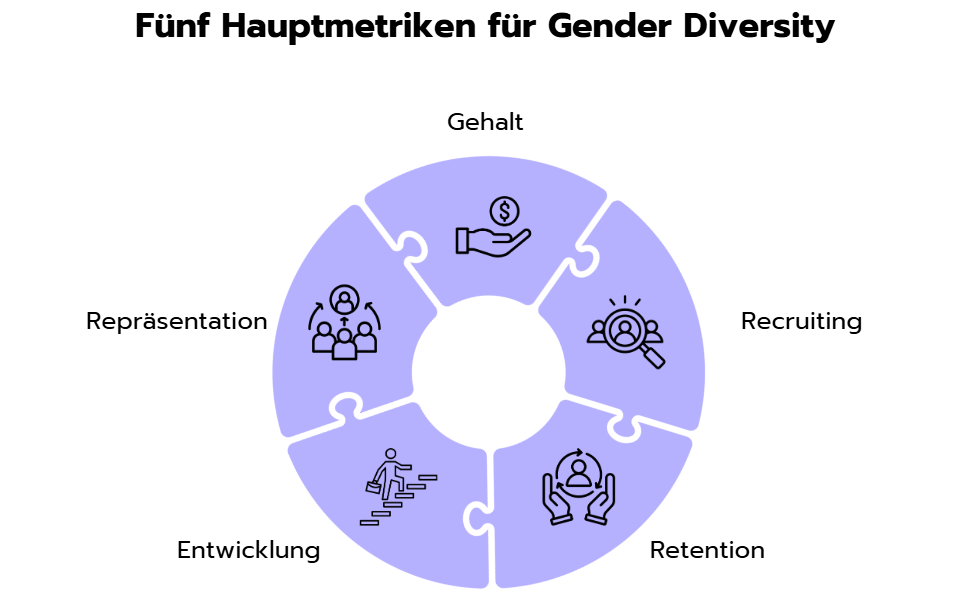Consulting – eine Karriere mit attraktiven Gehältern und vielversprechenden Aufstiegschancen. Auch ein Plus: Immer mehr Beratungsunternehmen setzen gezielt auf Diversität und fördern weibliche Talente. Trotzdem sind Führungspositionen nach wie vor überwiegend männlich besetzt.
Dabei zeigt der Gender Diversity Index 2023 von BCG, dass Unternehmen mit ausgeglichener Geschlechterverteilung kreativer, innovativer und erfolgreicher sind. Vielfältige Teams treffen bessere Entscheidungen, arbeiten effizienter – und Frauen, die in einem solchen Umfeld tätig sind, zeigen oft mehr Engagement und Ambition. Doch wie sieht die Realität aus?
Wie erleben junge Beraterinnen ihren Einstieg? Gibt es noch Herausforderungen oder Vorurteile? Wo gibt es Nachholbedarf zum Thema Diversity bei Unternehmen? Falls du über eine Karriere in der Beratung nachdenkst, aber noch unsicher bist, findest du in diesem Artikel alle wichtigen Informationen. Gemeinsam mit unseren weiblichen Interview-Coaches räumen wir mit Mythen auf, geben Einblicke in den Berufsalltag und verraten dir wertvolle Tipps für einen erfolgreichen Start. 🚀
Warum Frauen im Consulting unverzichtbar sind
Die Nachfrage nach diversen Beratungsteams wächst – viele Unternehmen legen heute Wert darauf, dass Frauen in ihren Projektteams vertreten sind. Doch warum genau profitieren Beratungsteams von einem höheren Frauenanteil?
Studien zeigen, dass gemischte Teams bessere Lösungen entwickeln – sowohl für ihre Kund:innen als auch für deren Endkund:innen. Vielfalt führt zu einer breiteren Perspektive, innovativeren Ansätzen und einer effektiveren Entscheidungsfindung. Darüber hinaus werden Frauen im Consulting oft mit bestimmten Stärken in Verbindung gebracht:
- Starke Coaching-Fähigkeiten: Frauen gelten als besonders gute Coaches und Mentorinnen, da sie häufig eine hohe soziale Sensibilität und Kommunikationsstärke mitbringen.
- Ganzheitliches Denken: Sie werden oft als reflektierter wahrgenommen, was dazu beiträgt, Probleme aus verschiedenen Blickwinkeln zu analysieren und langfristige Strategien zu entwickeln.
- Strukturierte und effiziente Führung: Viele Kund:innen nehmen wahr, dass Projekte unter weiblicher Leitung eher im Zeit- und Budgetrahmen bleiben.
- Stärken im Stakeholder-Management: Weibliche Projektmanager werden häufig als besonders geschickt im Umgang mit unterschiedlichen Interessengruppen gesehen.
Natürlich sind diese Eigenschaften nicht exklusiv weiblich – jedoch zeigen sich in diversen Teams oft genau diese positiven Effekte. Der Trend ist klar: Vielfalt macht Beratung erfolgreicher.
"Mythen" über Frauen im Consulting – richtig oder veraltet?
Die Unternehmensberatung ist ein Bereich, der von vielen Vorurteilen geprägt ist, auch in Bezug auf weibliche Consultants und ihre Arbeitsbedingungen. Wir haben unsere weiblichen Coaches gefragt, was sie zu den fünf häufigsten Vorurteilen zu sagen haben. Sind sie Mythen oder sind sie wahr?
1. Eine erfolgreiche Karriere in der Beratung lässt sich nicht mit einem erfüllten Familienleben vereinen.
Viele Frauen zweifeln, ob sich eine Karriere in der Beratung mit einem Familienleben vereinbaren lässt – oft aus Sorge, sich zwischen beidem entscheiden zu müssen. Doch die Branche hat sich in den letzten Jahren gewandelt: Hybrides und remote Arbeiten sind seit 2020 stark gestiegen, wodurch sich Reisetätigkeit und Arbeitsbelastung flexibler gestalten lassen.
Der Schlüssel kann aber auch in einem verlässlichen Netzwerk und klaren Absprachen liegen – sowohl im beruflichen als auch im privaten Umfeld.
2. Eine Frau kann es nicht auf Partner-Level schaffen.
Für Einstiegspositionen wird in der Regel eine vergleichbare Anzahl von männlichen und weiblichen Absolvent:innen eingestellt. Je höher jedoch das Karrierelevel, desto geringer wird der Anteil weiblicher Consultants. Wie sehen das unsere Coaches?
Dennoch gibt es für Frauen einige Herausforderungen, die sie im Laufe ihrer Karriere bewältigen müssen. Doch mit durchsetzungsvermögen und starken führungskompetenzen kann es gelingen.
3. Männer werden im Consulting besser bezahlt als Frauen.
Das Vorurteil, dass die Beratungsbranche von Männern dominiert wird, geht oft mit der Annahme einher, dass Männer im Consulting mehr verdienen als Frauen. Tatsächlich existiert in vielen Unternehmen eine geschlechtsspezifische Lohnlücke – allerdings nicht aufgrund ungleicher Bezahlung für gleiche Arbeit, sondern weil Frauen seltener in höheren, besser vergüteten Positionen vertreten sind. Auf gleicher Karrierestufe verdienen Beraterinnen und Berater in der Regel das gleiche Gehalt.
Auch wenn ungleiche Aufstiegschancen in manchen Fällen weiterhin bestehen, machen andere die Erfahrung, dass die Vergütung im Consulting vor allem leistungsbasiert und unabhängig vom Geschlecht ist.
4. Heutzutage werden Frauen in der Beratung begünstigt.
Gleichstellungsmaßnahmen im Consulting werfen immer wieder die Frage auf, ob sie Frauen tatsächlich fördern – oder Männer benachteiligen. Viele große Beratungsunternehmen haben mittlerweile frauenspezifische Netzwerke und Förderprogramme eingerichtet, um weibliche Talente gezielt zu unterstützen. Einige Firmen setzen zudem auf Frauenquoten, die in bestimmten Fällen Bewerberinnen bevorzugen können.
Doch führt das wirklich zu einer unfairen Bevorzugung? Unsere Coaches teilen ihre Perspektiven dazu.
Also: Es gibt definitiv einen Trend, dass Frauen mehr und mehr Unterstützung erfahren. Das heißt allerdings nicht, dass sie dadurch begünstigt werden.
5. Beraterinnen fürchten sich vor männlich dominierten Kund:innengruppen.
Beratungsfirmen bedienen große multinationale Unternehmen, die in vielen Ländern historisch gesehen von Männern dominiert wurden (insbesondere auf der obersten Führungsebene). Dies könnte eine zweifache Wirkung haben:
- Es könnte Frauen davon abhalten, sich in der Beratung zu bewerben, und
- Unsicherheit unter den Beraterinnen schaffen.
Wie Consulting-Firmen Hürden für Frauen abbauen können
Um Frauen den Einstieg und Aufstieg in der Beratungsbranche zu erleichtern, müssen Unternehmen zunächst ihre Kennzahlen zur Geschlechter-Diversität analysieren. Nur so lassen sich Schwachstellen erkennen und gezielte Maßnahmen entwickeln, um Chancengleichheit zu fördern.

Gehalt: Gibt es geschlechtsspezifische Unterschiede in der Vergütung? Unternehmen sollten Gehälter regelmäßig überprüfen und sicherstellen, dass Frauen für gleiche Arbeit gleich bezahlt werden.
Recruiting: Wie vielfältig ist der Bewerbungsprozess? Eine gezielte Ansprache und objektive Auswahlprozesse können dazu beitragen, mehr Frauen für die Consulting-Branche zu gewinnen.
Retention (Mitarbeiterbindung): Wie lange bleiben Frauen im Unternehmen? Hohe Fluktuation kann darauf hinweisen, dass Arbeitsbedingungen oder Aufstiegschancen nicht gleich verteilt sind.
Entwicklung: Haben Frauen die gleichen Chancen auf Weiterentwicklung? Unternehmen sollten sicherstellen, dass Schulungen, Beförderungen und Karriereprogramme geschlechtsneutral gestaltet sind und Frauen aktiv gefördert werden.
Repräsentation: Wie hoch ist der Frauenanteil in verschiedenen Hierarchieebenen? Ein Blick auf die Verteilung von Frauen in Führungspositionen zeigt, ob sie die gleichen Chancen haben, in verantwortungsvolle Rollen aufzusteigen.
Viele Beratungsunternehmen haben basierend auf diesen Kennzahlen bereits Programme eingeführt, um Frauen aktiv in ihrer Karriere zu unterstützen. Zu den wichtigsten Maßnahmen gehören:
- Coaching- und Mentoring-Programme: Individuelle Unterstützung für Frauen, um Karrierechancen zu verbessern und Herausforderungen frühzeitig zu erkennen – bevor sie zur Hürde werden.
- Netzwerke und Recruiting-Events: Austausch- und Fördermöglichkeiten speziell für Frauen, um gezielt Talente zu gewinnen und langfristig zu binden.
- Unternehmenskultur stärken: Sensibilisierung von Führungskräften und Projektleitern, damit sie auf die Bedürfnisse ihrer Teams eingehen und ein inklusives Arbeitsumfeld schaffen.
- Flexible Arbeitsmodelle: Teilzeitoptionen, Remote-Arbeit und individuelle Arbeitszeitgestaltung, um berufliche Entwicklung mit persönlichen Prioritäten zu vereinen.
- Elternzeit und Wiedereinstieg: Strukturiertes Mutterschafts- und Vaterschafts Angebot sowie gezielte Unterstützung nach der Elternzeit, um Karriereabbrüche zu vermeiden.
- Finanzielle Unterstützung: Zuschüsse für Kinderbetreuung und Überstundenvergütung für Eltern, um die Doppelbelastung zu reduzieren.
- Räumlichkeiten für stillende Mütter: Einrichtung von speziellen Rückzugsorten im Büro, um den Wiedereinstieg nach der Elternzeit zu erleichtern.






